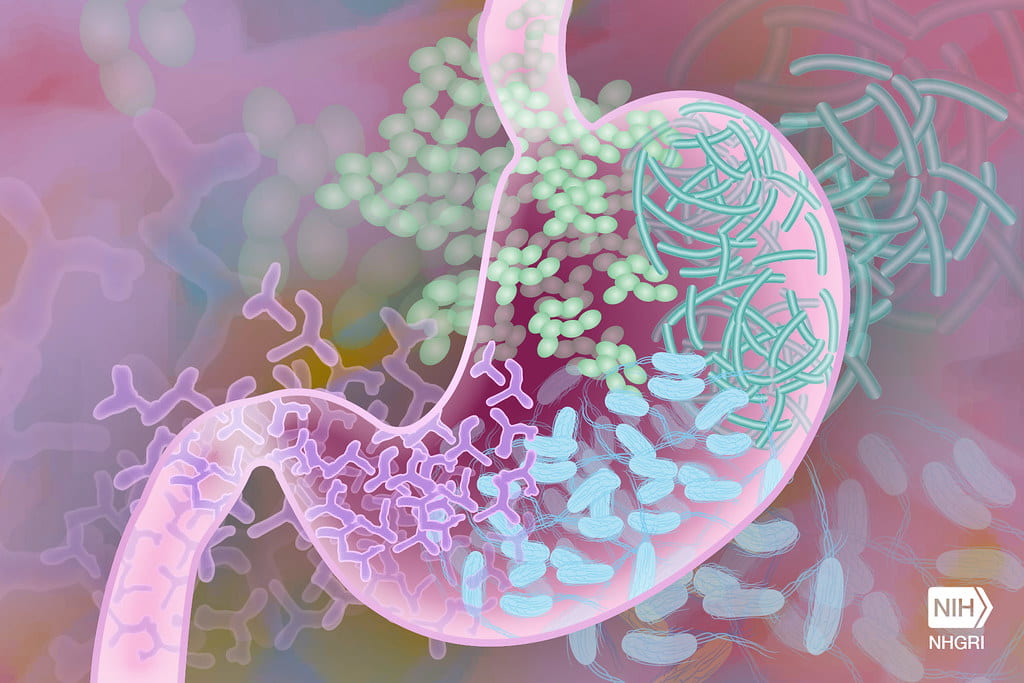
Have you heard of terms like the microbiome, gut microbiota, or gut flora and been confused by their meaning? Ever wondered how probiotics and prebiotics relate to these terms? Read on to learn more about the fascinating world of the microbiome and how it relates to our health.
What exactly is the gut microbiome?
The term “microbiota” refers specifically to groups of microbes. The gut microbiota is the collection of microbes living in the gut (bacteria, viruses, yeast, fungi, parasites). Did you know there are more than 100 trillion microbes in the human digestive tract, most of which are good for you and found in the large intestine? The “microbiome” incorporates microbiota and refers to collections of microbes and the environment where they live. The human body houses multiple microbiomes the largest of which is in the gut. We each have a unique gut microbiota that develops at birth and continues to diversify during infancy. As we age, environmental exposures, medications, and dietary patterns can all alter the composition of the gut microbiota and in turn, impact the health of the gut microbiome.
What’s so special about the gut microbiota?
The gut microbiota plays a key role in many aspects of health including:
- Strengthening the immune system and gut barrier to prevent the invasion of pathogens
- Decreasing harmful inflammation in the body, which may reduce the risk of chronic disease
- Assisting in metabolic function and hormone regulation (hunger cues, bile recycling, blood sugar regulation)
- Contributing to cognitive and mental health status
Why is nutrition important for gut health?
A diet that includes fiber-rich and probiotic foods can help promote a healthy gut microbiota. Let’s dive into fiber first. Fiber is a special type of carbohydrate that is non-digestible and found in plant foods. So what’s a prebiotic and how does it relate to fiber? A prebiotic is a specific type of fiber that is fermentable, acting as food for the healthy microbes living in the gut to produce short chain fatty acids, enzymes, vitamins, and neurotransmitters, all of which contribute to the functions of the gut microbiota. Foods rich in prebiotics include beans, leafy greens, whole grains, asparagus, artichokes, onions, garlic, almonds, flaxseeds, bananas, and berries.
Now let’s talk about Probiotics. Probiotics are live microbes that bestow health benefits when consumed in appropriate and sufficient amounts. Bifidobacterium and Lactobacillus species are the most common probiotics found in foods and supplements. Different probiotics offer different health benefits, and we’re still learning about the various types and functions of each. Fermented foods such as yogurt, kefir, sauerkraut, tempeh, and miso often contain probiotics. Notably, not all fermented foods contain probiotics due to processing techniques, like pasteurization or even baking, which kill or remove the live probiotics. How do you know if fermented foods contain probiotics? Check just below the ingredients list on the food or beverage label to see which probiotics are included. You can also reach out to the company directly to determine whether or not the fermented food contains live probiotics.
What’s the deal with probiotic supplements? Research has demonstrated that probiotic supplementation may help support a variety of health conditions, some of which include:
- Symptoms that may occur with antibiotics treatment, such as diarrhea
- Development of upper respiratory infections
- May support overall heart health and management of type II diabetes
- Symptoms of irritable bowel syndrome
If you are considering a probiotic, what is important to consider? When choosing a probiotic, select a product that has scientific support, is third-party tested, and contains microbes that are beneficial to your unique needs. Since the gut microbiota varies between individuals, there is not a one-size-fits-all approach. A person’s genetics, health conditions, environmental exposures, and specific microbial composition are all important considerations. Talk with your healthcare provider or a registered dietitian to receive tailored advice on selecting a probiotic supplement and whether or not a probiotic supplement is right for you.
Want to know how you can get more prebiotic and probiotic-rich foods in your diet? Join our ProActive Nutrition cooking class “Nourishing Your Gut: Foods that Support a Healthy Microbiome” on March 22nd from noon – 1pm. To ensure enough supplies and ingredients are prepared, please RSVP.
Want an even deeper dive into the microbiome and nutrition? Join our WES presentation, “All About the Microbiome”, on March 21st from Noon – 1p.m.
